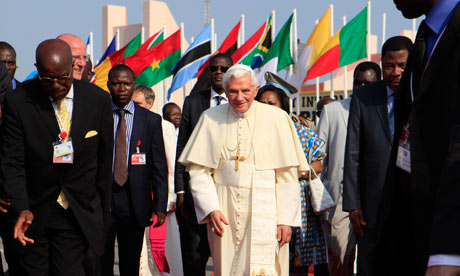Here she is singing the opening arias to L’Orfeo by Monteverdi.
The Mistakes of Historians
One of the huge mistakes musicologists and historians make is not realizing how LITTLE has been preserved through the centuries. They need to realize that we currently possess mere fragments, many of them preserved by accident. Yet, historians and musicologists so often forget this fact. So often, they make the terrible mistake of looking at what has survived and making assumptions based only on these things. A more sensible approach is to realize and admit that we have very little, and what has been preserved does not necessarily represent the entirety of (for example) the Gregorian repertoire.
Pope Benedict in Africa: “Reserves of Life and Vitality for the Future”
“In Africa”, the Holy Father explained, “I saw a freshness in the ‘yes’ to life, a freshness of religious meaning and hope, a holistic vision of reality where God is not confined to that positivist perspective which, in the final analysis, extinguishes all hope. This tells us that the continent contains reserves of life and vitality for the future, reserves upon which we can rely, upon which the Church can rely.”
The Caecila Project
 Andrew Hinkley of the Caecilia Project has taken upon himself the task of transcribing the entire Graduale Romanum in GABC code, for use with the virtually industry standard Gregorio Gregorian chant engraving platform.
Andrew Hinkley of the Caecilia Project has taken upon himself the task of transcribing the entire Graduale Romanum in GABC code, for use with the virtually industry standard Gregorio Gregorian chant engraving platform.
He has been working on this project for several years now and has begun posting sample engravings from his code in both the style of the 1908 Graduale (no rhythmic signs) and in the manner of the 1961 Graduale (with episemas). His plan is to post engravings of all five Gregorian propers each week as we proceed through the new liturgical year. Please be sure to bookmark this site, and follow his progress.
Andrew has done all of this work for no payment, and is asking no payment in return for his work. He has undertaken this magnanimous task only for love of the Church and the sacred liturgy.
You can help him by proof-reading these engravings and reporting errors in the comment box at the Caecilia Project blog. If enough eyes pass over these engravings there is great hope that the entire Graduale, accurately engraved, could be available to the world freely in source code that can be processed in endless ways, for use in endless applications. Imagine the possibilities for us and for future generations of Catholics!
I personally would like to see him post the source code each week in addition to the one-off PDFs. You might enjoy playing around with it at Richard Chonak’s online GABC processing tool where you can experiment with different fonts, sizing options, and so on.
Thank you, Andrew, for this wonderful work. Future generations of Catholics will thank you!
Another pew aid
Sacred Music Colloquium Registration is Open
You have heard about the legendary Sacred Music Colloquium. Now is the time to make the commitment and come. Edition XXII runs June 25-July 1, 2012.
This year, the program is being opened up even more and in two ways. The presence of a far larger and more diverse faculty makes it an ideal place for professional musicians. At the same time, the extensive programming and lectures make it possible for people who do not intend to sing all week or even at all to enjoy the events and learn. Both of these changes are new. The idea here is to make room for people who do not necessarily want to sing all day every day. There will be classes on every topic you can imagine, and extensive opportunities for socializing and learning.
I haven’t mentioned the main extraordinary thing actually. The location is Salt Lake City. The venue is the Cathedral of the Madeleine. This place is absolutely among the most beautiful liturgical spots in the United States if not the world. The Cathedral has been fully opened up to us, as has the wonderful choir school that is connected to the cathedral. In so many ways, this move represents a glorious new epoch for the sacred music colloqium and for the CMAA – and for sacred music generally!
St. Cecilia, Pray for us
 Litany of St. Cecilia
Litany of St. Cecilia
Lord, have mercy on us. Christ, have mercy on us. Lord, have mercy on us.
Christ hear us. Christ, graciously hear us.
God the Father of Heaven, Have mercy on us.
God the Son, Redeemer of the world, Have mercy on us.
God the Holy Spirit, Have mercy on us.
Holy Trinity, one God, Have mercy on us.
Holy Mary, Mother of God, Pray for us.
Saint Cecilia, Pray for us.
Saint Cecilia, wise virgin, Pray for us.
Saint Cecilia, whose heart burned with the fire of Divine love, Pray for us.
Saint Cecilia, apostle by thy zeal and charity, Pray for us.
Saint Cecilia, who converted thy spouse and procured for him the crown of Martyrdom, Pray for us.
Saint Cecilia, who by thy pleadings moved the hearts of pagans, and brought them into the true Church,
Pray for us.
Saint Cecilia, who didst unceasingly see thy guardian Angel by thy side, Pray for us.
Saint Cecilia, who didst mingle thy voice with the celestial harmonies of the virgins, Pray for us.
Saint Cecilia, who by thy melodious accents celebrated the praises of Jesus, Pray for us.
Saint Cecilia, illustrious Martyr of Jesus Christ, Pray for us.
Saint Cecilia, who during three days dist suffer most excruciating torments, Pray for us.
Saint Cecilia, consolation of the afflicted, Pray for us.
Saint Cecilia, protectress of all who invoke thee, Pray for us.
Saint Cecilia, patroness of holy canticles, Pray for us.
Saint Cecilia, special patroness and advocate of all singers, musicians, authors, and students, Pray for us.
We salute thee, O Virgin, who didst give thy blood for the defense and faith of Jesus Christ.
Lamb of God, Who takest away the sins of the world, Spare us, O Lord.
Lamb of God, Who takest away the sins of the world, Graciously hear us, O Lord.
Lamb of God, Who takest away the sins of the world, Have mercy on us.
God glorified Saint Cecilia,
And He crowned her virtues.
Let us pray: O Eternal God, Who didst give us, in the person of Saint Cecilia, a powerful protectress, grant that after having faithfully passed our days, like herself, in innocence and holiness, we may one day attain the land of beatitude, where in concert with her, we may praise Thee and bless Thee forevermore in eternity. Amen.



